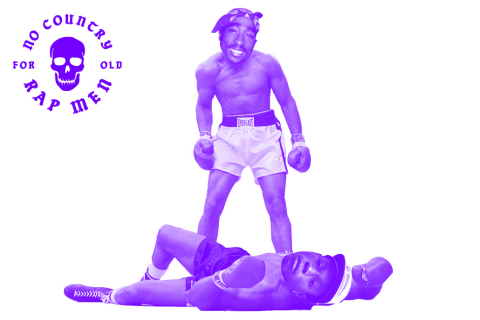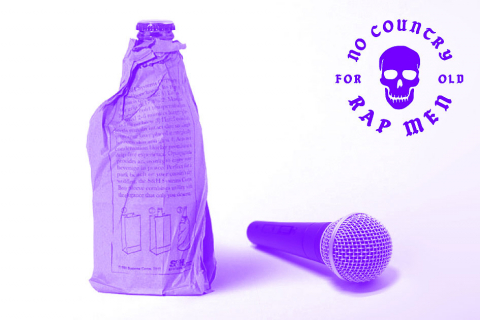
Are you perchance a fan of Biggie Smalls and enjoy films? You’re in luck, friends, because the Notorious B.I.G. has already been the topic of five documentaries, a dramatisation of his life titled Notorious and several films focusing on the feud between Big and Tupac and the mystery surrounding their unsolved murders. If that wasn’t enough to satisfy your Big Poppa cravings then you can also look forward to the Johnny Depp vehicle about a detective investigating both cases and an upcoming television series about rap’s ultimate frenemies.
While the long-running public interest in Biggie and Pac is understandable, given how revered they were while they were alive and the shared tragic circumstances of their demise, it’s also an unfortunate reflection on the tendency that the hip-hop community has of wheeling out the same well-worn stories instead of making the effort to tell new ones. Take, for example, the recent announcement of Russell Simmons’ new hip-hop history documentary, which will no doubt wheel out the exact same collection of self-aggrandising windbags who feature in every single rap-related documentary ever.
Here’s the blueprint for how these documentaries work:
- Show some footage of a burnt-out block in the Bronx, talk about Kool Herc throwing a rent party.
- Roll out Bambaataa, Flash, and Theodore to talk about DJing and which parts they invented when they weren’t hanging out with sweaty, muscle-bound young men dressed in leather.
- A bit about ‘Rapper’s Delight’ and how it sold a trillion twelve-inch singles after a guy from a pizza shop borrowed his mate’s rhyme book.
- A montage of footage of Run-DMC taking over the world, cut between snippets of Reverend Run and his transformation into the human marshmallow Stay Puff man.
- Russell Simmons and Rick Rubin explaining how visionary they were in signing LL Cool J, the Beastie Boys and Public Enemy. Yoga mat and shoes optional.
- Something about the L.A. ‘gangsta rap explosion’ featuring N.W.A, Ice-T, and some uber subtle Beats By Dre product placement shots.
- A quick segment about the pop rap era of MC Hammer, Tone Loc, and Vanilla Ice because funny pants.
- 20 minutes about Biggie and Tupac so that Puffy and Lil’ Cease can get some camera time.
- Mandatory Snoop Dogg appearance because even your grandmother loves her some Snoop.
- 10 minutes about how Jay Z pulled himself up from his bootstraps to become the world’s richest rap guy, despite having the speaking voice of a socially awkward 12-year-old.
- A section dedicated to the Caucasian Sensation himself, Eminem, and his love of XXL shell suits, wife beater singlets, and hair bleach.
- Footage of Lil’ Wayne attempting to ride a skateboard under the influence of a heroic quantity of lean.
- An intimate portrait of Kanye West shopping for spats.
- Kendrick Lamar declared to be the greatest artist of the last million years and therefore the ultimate evolution of rap music and all life on earth.
- Fast forward to an outro celebrating how hip-hop has spread across the globe to help sell hamburgers and fizzy drinks.
- The End.
Here’s a crazy idea: why not try to fill in some of the gaps and talk about some of the other vital points in the development of the music? Or how about giving some air-time to the numerous influential groups that were active before the million-selling CD era? Nope, that’s straight to the ‘too hard basket’. Even if you buy the argument that a film covering more obscure artists isn’t commercially viable, then at the very least we expect that an effort is made to dig a little beneath the surface and paint a fuller picture of the reliable cast who always put their hands up to be interviewed.
If I’m to to be expected to endure another film that follows the formula that I’ve detailed above, how about throwing a couple of curveballs into the mix? Why has no one ever tackled the issue of the influence of gay nightclub culture has on dance music and therefore the evolution of early hip-hop? Why does Rush never get called to account for the tragic fate of his former production partner Larry Smith – who, it’s been alleged, was swindled out of his publishing rights to many early rap classics so that Def Jam could sign a distribution deal with Columbia and died virtually destitute in 2015?
Instead of the umpteenth retelling of the Def Jam fable, wouldn’t it be refreshing to delve into the stories behind Enjoy Records, Cold Chillin’, First Priority Music, Sleeping Bag, Tuff City, Wild Pitch, Profile, Next Plateau and Pop Art? As is usually the case, these films only get made to serve in the self-interest of whoever is involved, which is why Ice-T’s The Art of Rap is just as much about how wonderful everyone thinks Ice is, as it is about rap music and how the Stretch and Bobbito doc is equally concerned with showcasing how many famous people will let them hang out in their kitchens.
What this all amounts to is the realisation that rather than complaining about this shit, it’s time I went and made that Flavor Unit documentary I keeping flapping my gums about. Even if, in the words if The 45 King himself, it will only ever be seen by three people in Japan. Until then, enjoy paying old money for old rope!



